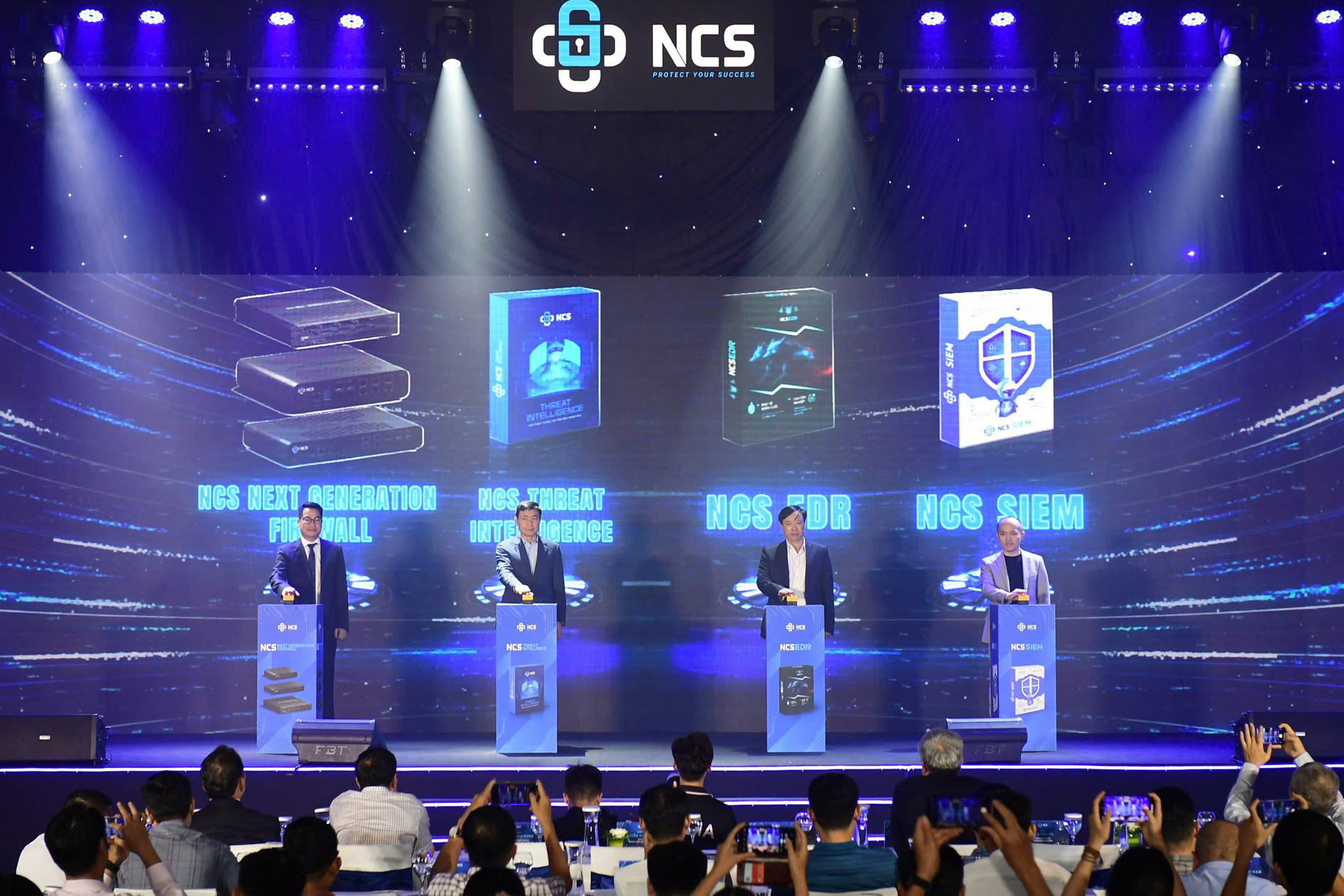On the afternoon of July 2 in Hanoi, the Vietnam National Cyber Security Technology Corporation (NCS) officially launched its AI-driven cybersecurity product ecosystem.

This comprehensive solution aims to help agencies and businesses establish strong, cost-effective security foundations to meet the increasing demands of the digital environment.
As cyberattacks grow in both volume and sophistication, cybersecurity has emerged as one of the most pressing challenges for organizations and enterprises.
According to the National Cybersecurity Association, in 2024, 46.15% of agencies and businesses reported cybersecurity incidents, with an estimated 659,000 attacks occurring.
Yet, 52.89% of organizations in Vietnam still lack adequate technological solutions to respond to incidents, and 56.16% lack dedicated cybersecurity personnel.
“This ecosystem will help organizations and businesses safeguard the achievements of digital transformation, innovation, and technological advancement,” said NCS Chief Technology Officer Nguyen Ngoc Son.
A Cisco report further highlights the urgency, revealing that only 11% of Vietnamese enterprises have reached a mature level in cybersecurity incident response.
The NCS ecosystem is built on a philosophy combining advanced monitoring technology, real-world experience, artificial intelligence, and diverse threat intelligence data sources to create a highly effective multilayered defense system.
The ecosystem includes the NCS Next Generation Firewall, NCS Threat Intelligence (TI) platform, NCS Endpoint Detection and Response (EDR), and NCS Security Operations Center (SOC), which incorporates the NCS Security Information and Event Management (SIEM) and NCS Security Orchestration, Automation and Response (SOAR) platforms.
Nguyen Ngoc Son, CTO and chief architect of the ecosystem, stated: “We’ve integrated nearly 300 commonly used hacking techniques and trained 12 dedicated AI models, significantly improving threat detection capabilities and reducing manual work.
This ecosystem empowers organizations and enterprises to protect their digital transformation, innovation, and technology initiatives.”
According to the developer, the NCS Next Generation Firewall operates on x86 microprocessor architecture with algorithmic acceleration, enabling application-layer control and bandwidth monitoring of up to 300 Gbps at network gateways.
Its deep packet inspection (DPI) technology reads, processes, and transmits packets without copying content, minimizing operating system interference and enabling the processing of tens of millions of packets per second.
Key firewall features include rule-based access control, anomaly detection and intrusion prevention (IPS) with over 8,500 signatures, application control, and malware blocking.
The NCS TI platform uses threat intelligence as a proactive security layer to combat attacks early and remotely. Its data, continuously updated from over 100 sources, is enriched by AI tools and expert analysis.
This enables seamless integration into various security solutions and devices in line with international standards.
Output data from NCS TI includes information on malware, malicious domains, criminal groups, attack techniques, and new vulnerabilities. It also helps detect data leaks, brand abuse, and potential crises, allowing organizations to act proactively.
The NCS EDR solution, built on an “all-in-one” concept, integrates antivirus, data loss prevention (DLP), anti-encryption, security policy enforcement, personal firewall, and incident investigation into a single interface. This approach cuts investment costs, optimizes human resources, and ensures robust endpoint protection with one unified solution.
The NCS SOC features two key components: NCS SIEM and NCS SOAR. NCS SIEM enables centralized event management and analysis, capable of handling up to 540,000 events per second. It offers a 360-degree digital asset analysis view, using AI and more than 1,300 detection rules to identify and alert on potential threats.
Beyond log-based investigation, NCS SIEM also suggests potential hacker attack vectors, aiding administrators in developing effective defense strategies.
Meanwhile, NCS SOAR focuses on managing incidents, streamlining coordination and response processes, and automating reaction scenarios through pre-configured playbooks.
NCS CEO Nguyen Duy Hien emphasized that the ecosystem’s products are designed in compliance with both Vietnamese and international standards.
Developed by Vietnamese experts, the ecosystem also benefits from international technology transfer and collaboration, shortening the time required to adopt cutting-edge technologies.
“The NCS ecosystem not only offers ‘Make in Vietnam’ solutions but also aims to strengthen domestic capabilities and progressively build Vietnam’s sovereign cybersecurity technologies, contributing to the development of a national cybersecurity industry,” he said.
Thai Khang